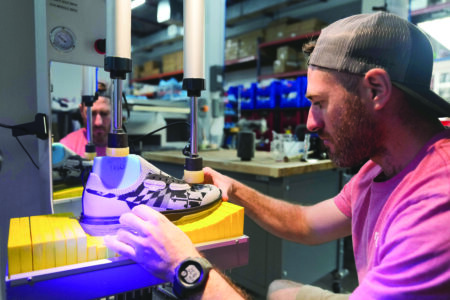Michigan Sea Grant gets new educator
Collaboration to help fisheries and aquaculture outreach, education

Dr. Lauren Jescovitch is shown standing inside a research area at the Great Lakes Research Center. Jescovitch plans to help connect MSU and Michigan Tech resources with the communities and residents of the Upper Peninsula. (Photo courtesy of Michigan Tech University)
By CINDY HUDSON
Michigan Sea Grant and
KELLEY CHRISTIANSEN
Michigan Tech Science Writer
HOUGHTON — Michigan State University Extension and Michigan Technological University have announced a new collaboration to enhance fisheries and aquaculture outreach and education in the Upper Peninsula.
Michigan Tech’s Great Lakes Research Center, located in Houghton, will host Dr. Lauren Jescovitch, a new Michigan Sea Grant Extension educator. Jescovitch, who began her new position on Oct. 28, plans to help connect MSU and Michigan Tech resources with the communities and residents of the Upper Peninsula.
Jescovitch also will have an office at the Houghton County MSU Extension office in Hancock.
“We’re very pleased to have this opportunity to work directly with Michigan Tech on this endeavor,” said MSU Extension Director Jeff Dwyer. “Dr. Jescovitch brings a great amount of fisheries and aquaculture knowledge, experience and enthusiasm, which will help both MSU and MTU continue to provide needed services and assistance to industry and tribal partners.”
Michigan Sea Grant helps foster economic growth and protect Michigan’s coastal Great Lakes resources through education, research and outreach. A collaborative effort of the University of Michigan and Michigan State University, Michigan Sea Grant is part of the NOAA National Sea Grant network of 34 university-based programs.
“I am pleased to have Dr. Jescovitch and Michigan Sea Grant/MSU Extension partner with Michigan Tech at the Great Lakes Research Center,” said Andrew Barnard, director of the GLRC. “I envision this partnership enabling broad and deep community outreach for Michigan Tech researchers throughout Michigan and surrounding states. Dr. Jescovitch’s expertise in aquaculture and fisheries will also be a valuable addition to Michigan Tech and the Keweenaw, and I look forward to a growing research and outreach partnership.”
The GLRC provides state-of-the-art laboratories to support research on a broad array of topics, and seeks to educate the scientists, researchers, policymakers and stakeholders of tomorrow about the Great Lakes Basin. The Center for Science and Environmental Outreach provides K-12 student, teacher, and community education and outreach programs. The GLRC also offers a lake-level marine facility and convenient deep-water docking, providing a year-round home for Michigan Tech’s surface and sub-surface fleet of marine vehicles.
Working as an aquaculture Extension educator seems a tailor-made career for Jescovitch.
“I enjoy working with people and communities to help them find practical solutions in day-to-day obstacles,” she said. “And I love being in the field. So I thought working in Extension would be a great match.”
Jescovitch earned a bachelor’s degree in both fisheries biology and environmental science at Mansfield University of Pennsylvania, and a master’s degree in fisheries and allied aquacultures from Auburn University. She also received a graduate certificate in college/university teaching while completing her Ph.D. in fisheries and allied aquacultures at Auburn.
It was a lifelong love of fishing that made deciding on a school and career path easy.
“I love learning, and I love to fish, so I just put the two together,” Jescovitch said. “In high school, I knew I wanted to go to college and I told my folks I wanted to get a fisheries biology degree. They didn’t think one really existed — so I had to prove it to them.”
Jim Thannum, director of planning and development for the Great Lakes Indian Fish and Wildlife Commission, said he appreciates this new position’s focus on aquaculture and fisheries.
“We’ve been fortunate in the U.P. to have had the services of Extension educator Dr. Ron Kinnunen for many years until his recent retirement,” Thannum said. “Dr. Kinnunen built strong partnerships between the commercial fishing industry and state, federal and tribal natural agencies in an effort to ensure the Great Lakes fisheries could continue to sustain jobs and maintain a cherished way of life. It is good to know that the Seafood HACCP courses he taught will continue to be provided through Dr. Jescovitch.”
Jescovitch is looking forward to partnering with tribal communities and others.
“Aquaculture is my wheelhouse,” she said. “But I know I will learn a lot from my partners in the U.P. I plan to listen and learn and be open and transparent. I have already felt welcomed by everyone at the Great Lakes Research Center. Their commitment to research is an inspiration. I’m looking forward to all the endless opportunities available.”
And what about those famous U.P. winters?
“I really like snow,” she said. “I haven’t spent all my time in Alabama. I actually grew up in the Poconos in northeastern Pennsylvania, so I can handle myself pretty well on snowy roads. Or, so I think …”





